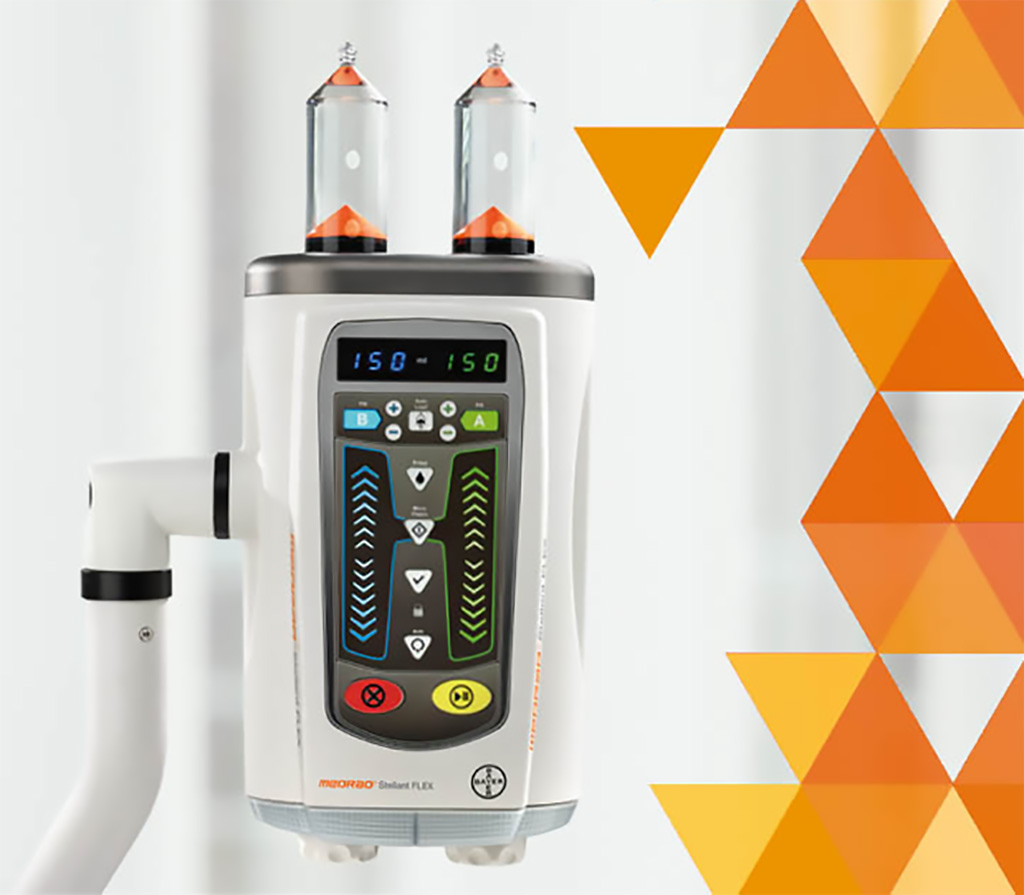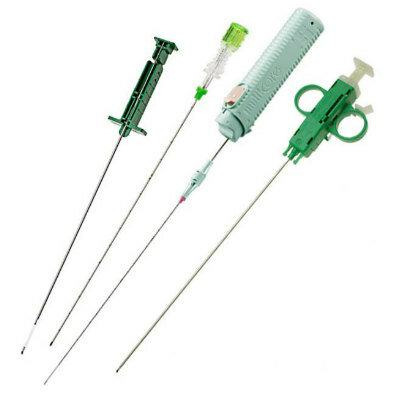Automated Injector Enables Contrast Dose Management
|
By HospiMedica International staff writers Posted on 24 Dec 2019 |

Image: The Bayer MEDRAD Stellant FLEX CT Injection System (Photo courtesy of Bayer)
An automated injection system allows users to fill disposable syringes with contrast media during computed tomography (CT) sessions.
The Bayer AG (Leverkusen, Germany) MEDRAD Stellant FLEX CT Injection System is a software-controlled platform for the administration of intravenous CT contrast media and saline into the human vascular system during diagnostic CT studies. Several of the key features of the injection system are designed to address provider clinical and financial challenges, including the provision of a flexible choice of syringes, such as a 200 mL standard syringe and a smaller (150 mL) lower-cost syringe option with less environmental impact.
Other features include user-programmed fluids volume, flow rate, and/or duration; beacon technology for easy visualization of fluids; updated scan room and control room technology; syringe size barcode identification; lot and expiry date information; an option for increased accuracy and automation of documentation with contrast barcode reader; and a streamlined training program. Through Bayer's TechCARE program, comprehensive service coverage will be combined with two free hardware upgrades over the course of a three-year contract.
“For more than 30 years, Bayer has supported the changing needs of radiology departments through groundbreaking advancements in injector, informatics and service innovations, ultimately allowing for improved patient care,” said Dennis Durmis, head of region Americas at Bayer Radiology. “The automated capture of contrast and injection parameters with Stellant FLEX reduces the number of manual tasks and potential errors.”
“Upgrading to the next generation CT injection technology with Bayer's Stellant FLEX has allowed us to streamline workflow operation. The new features have reduced documentation errors, there is little training needed for our technologist to use it, and we couldn't ask for a better sized syringe to be developed,” said Andrew Clark, PACS administrator at Salem Regional Medical Center (OH, USA). “All of the new features combined make it a robust platform that covers all of our needs.”
Related Links:
Bayer AG
The Bayer AG (Leverkusen, Germany) MEDRAD Stellant FLEX CT Injection System is a software-controlled platform for the administration of intravenous CT contrast media and saline into the human vascular system during diagnostic CT studies. Several of the key features of the injection system are designed to address provider clinical and financial challenges, including the provision of a flexible choice of syringes, such as a 200 mL standard syringe and a smaller (150 mL) lower-cost syringe option with less environmental impact.
Other features include user-programmed fluids volume, flow rate, and/or duration; beacon technology for easy visualization of fluids; updated scan room and control room technology; syringe size barcode identification; lot and expiry date information; an option for increased accuracy and automation of documentation with contrast barcode reader; and a streamlined training program. Through Bayer's TechCARE program, comprehensive service coverage will be combined with two free hardware upgrades over the course of a three-year contract.
“For more than 30 years, Bayer has supported the changing needs of radiology departments through groundbreaking advancements in injector, informatics and service innovations, ultimately allowing for improved patient care,” said Dennis Durmis, head of region Americas at Bayer Radiology. “The automated capture of contrast and injection parameters with Stellant FLEX reduces the number of manual tasks and potential errors.”
“Upgrading to the next generation CT injection technology with Bayer's Stellant FLEX has allowed us to streamline workflow operation. The new features have reduced documentation errors, there is little training needed for our technologist to use it, and we couldn't ask for a better sized syringe to be developed,” said Andrew Clark, PACS administrator at Salem Regional Medical Center (OH, USA). “All of the new features combined make it a robust platform that covers all of our needs.”
Related Links:
Bayer AG
Latest Surgical Techniques News
- Tiny Wraparound Electronic Implants to Revolutionize Treatment of Spinal Cord Injuries
- Small, Implantable Cardiac Pump to Help Children Awaiting Heart Transplant
- Gastrointestinal Imaging Capsule a Game-Changer in Esophagus Surveillance and Treatment
- World’s Smallest Laser Probe for Brain Procedures Facilitates Ablation of Full Range of Targets
- Artificial Intelligence Broadens Diagnostic Abilities of Conventional Coronary Angiography
- AI-Powered Surgical Visualization Tool Supports Surgeons' Visual Recognition in Real Time
- Cutting-Edge Robotic Bronchial Endoscopic System Provides Prompt Intervention during Emergencies
- Handheld Device for Fluorescence-Guided Surgery a Game Changer for Removal of High-Grade Glioma Brain Tumors
- Porous Gel Sponge Facilitates Rapid Hemostasis and Wound Healing
- Novel Rigid Endoscope System Enables Deep Tissue Imaging During Surgery
- Robotic Nerve ‘Cuffs’ Could Treat Various Neurological Conditions
- Flexible Microdisplay Visualizes Brain Activity in Real-Time To Guide Neurosurgeons

- Next-Gen Computer Assisted Vacuum Thrombectomy Technology Rapidly Removes Blood Clots
- Hydrogel-Based Miniaturized Electric Generators to Power Biomedical Devices
- Custom 3D-Printed Orthopedic Implants Transform Joint Replacement Surgery
- Wearable Technology Monitors and Analyzes Surgeons' Posture during Long Surgical Procedures
Channels
Artificial Intelligence
view channel
AI-Powered Algorithm to Revolutionize Detection of Atrial Fibrillation
Atrial fibrillation (AFib), a condition characterized by an irregular and often rapid heart rate, is linked to increased risks of stroke and heart failure. This is because the irregular heartbeat in AFib... Read more
AI Diagnostic Tool Accurately Detects Valvular Disorders Often Missed by Doctors
Doctors generally use stethoscopes to listen for the characteristic lub-dub sounds made by heart valves opening and closing. They also listen for less prominent sounds that indicate problems with these valves.... Read moreCritical Care
view channel
AI to Improved Diagnosis of Atrial Fibrillation
Abnormal heart rhythms frequently arise from—and contribute to—structural abnormalities in the heart. Atrial fibrillation is a specific type of abnormal rhythm that may not be consistently present, often... Read more
Stretchable Microneedles to Help In Accurate Tracking of Abnormalities and Identifying Rapid Treatment
The field of personalized medicine is transforming rapidly, with advancements like wearable devices and home testing kits making it increasingly easy to monitor a wide range of health metrics, from heart... Read more
Machine Learning Tool Identifies Rare, Undiagnosed Immune Disorders from Patient EHRs
Patients suffering from rare diseases often endure extensive delays in receiving accurate diagnoses and treatments, which can lead to unnecessary tests, worsening health, psychological strain, and significant... Read morePatient Care
view channelFirst-Of-Its-Kind Portable Germicidal Light Technology Disinfects High-Touch Clinical Surfaces in Seconds
Reducing healthcare-acquired infections (HAIs) remains a pressing issue within global healthcare systems. In the United States alone, 1.7 million patients contract HAIs annually, leading to approximately... Read more
Surgical Capacity Optimization Solution Helps Hospitals Boost OR Utilization
An innovative solution has the capability to transform surgical capacity utilization by targeting the root cause of surgical block time inefficiencies. Fujitsu Limited’s (Tokyo, Japan) Surgical Capacity... Read more
Game-Changing Innovation in Surgical Instrument Sterilization Significantly Improves OR Throughput
A groundbreaking innovation enables hospitals to significantly improve instrument processing time and throughput in operating rooms (ORs) and sterile processing departments. Turbett Surgical, Inc.... Read moreHealth IT
view channel
Machine Learning Model Improves Mortality Risk Prediction for Cardiac Surgery Patients
Machine learning algorithms have been deployed to create predictive models in various medical fields, with some demonstrating improved outcomes compared to their standard-of-care counterparts.... Read more
Strategic Collaboration to Develop and Integrate Generative AI into Healthcare
Top industry experts have underscored the immediate requirement for healthcare systems and hospitals to respond to severe cost and margin pressures. Close to half of U.S. hospitals ended 2022 in the red... Read more
AI-Enabled Operating Rooms Solution Helps Hospitals Maximize Utilization and Unlock Capacity
For healthcare organizations, optimizing operating room (OR) utilization during prime time hours is a complex challenge. Surgeons and clinics face difficulties in finding available slots for booking cases,... Read more
AI Predicts Pancreatic Cancer Three Years before Diagnosis from Patients’ Medical Records
Screening for common cancers like breast, cervix, and prostate cancer relies on relatively simple and highly effective techniques, such as mammograms, Pap smears, and blood tests. These methods have revolutionized... Read morePoint of Care
view channel
Critical Bleeding Management System to Help Hospitals Further Standardize Viscoelastic Testing
Surgical procedures are often accompanied by significant blood loss and the subsequent high likelihood of the need for allogeneic blood transfusions. These transfusions, while critical, are linked to various... Read more
Point of Care HIV Test Enables Early Infection Diagnosis for Infants
Early diagnosis and initiation of treatment are crucial for the survival of infants infected with HIV (human immunodeficiency virus). Without treatment, approximately 50% of infants who acquire HIV during... Read more
Whole Blood Rapid Test Aids Assessment of Concussion at Patient's Bedside
In the United States annually, approximately five million individuals seek emergency department care for traumatic brain injuries (TBIs), yet over half of those suspecting a concussion may never get it checked.... Read more
New Generation Glucose Hospital Meter System Ensures Accurate, Interference-Free and Safe Use
A new generation glucose hospital meter system now comes with several features that make hospital glucose testing easier and more secure while continuing to offer accuracy, freedom from interference, and... Read moreBusiness
view channel
Johnson & Johnson Acquires Cardiovascular Medical Device Company Shockwave Medical
Johnson & Johnson (New Brunswick, N.J., USA) and Shockwave Medical (Santa Clara, CA, USA) have entered into a definitive agreement under which Johnson & Johnson will acquire all of Shockwave’s... Read more
















